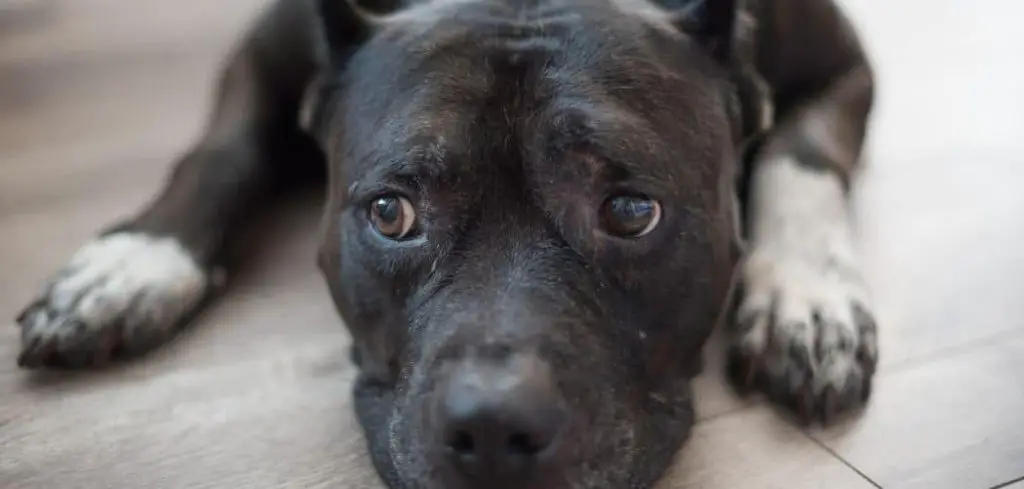It can be unsettling to see your dog panting and licking their lips at night, especially when the rest of the house is quiet and calm.
These behaviors can signal anything from anxiety to physical discomfort and may require close attention.
We outline the common causes of a dog panting and licking its lips at night, what you can do at home, and when to seek veterinary help.
Dog Panting and Licking Lips at Night — Why It Happens
Nighttime panting and lip licking in dogs are often signs of distress, discomfort, or underlying health conditions. These behaviors may be triggered by anxiety, nausea, pain, or even something as simple as a change in routine. Common causes include gastrointestinal upset, cognitive dysfunction in older dogs, or side effects of medications. Environmental stressors like unfamiliar noises or heat can also play a role.

Dog Panting and Licking Lips at Night: Common Causes
Anxiety or Nighttime Restlessness
Dogs can experience anxiety just like humans, and for some, nighttime is the most difficult period.
Separation anxiety, fear of noises (like thunderstorms or distant fireworks), or even past trauma can resurface after dark.
Panting is the dog’s way of managing internal stress, while licking their lips may signal nervousness or an attempt at self-soothing.
Other signs include pacing, whining, or seeking constant reassurance.
If this becomes a nightly occurrence, it may affect your dog’s rest and overall health.
Read more: Dog panting and pacing (Is it anxiety or something worse?)
Nausea or Digestive Upset
Nausea often leads dogs to lick their lips and pant as they try to cope with the uncomfortable sensation.
Causes can range from eating something they shouldn’t have to chronic conditions like acid reflux or pancreatitis.
If your dog shows signs of restlessness, drooling, or even vomiting alongside the panting and lip licking, nausea could be the root issue.
This behavior may be more obvious at night due to the dog lying down or the stomach being empty.
Pain or Discomfort
Pain often becomes more noticeable at night when your dog is lying still or trying to sleep.
Arthritis, injury, or internal pain (such as abdominal discomfort) can cause panting as the body’s response to pain and stress.
Lip licking may also be a pain response, especially if the pain is sharp or sudden.
Look for additional signs like reluctance to lie down, restlessness, or whining.
Cognitive Dysfunction (Canine Dementia)
Older dogs suffering from cognitive dysfunction may exhibit abnormal nighttime behavior.
Panting and lip licking may appear without a clear cause and can be accompanied by disorientation, pacing, or barking.
This is due to changes in brain function, and symptoms are often worse at night—similar to sundowning in humans with dementia.
These behaviors may also become more frequent over time.
Medication Side Effects
Some medications can cause restlessness, nausea, or increased panting in dogs.
Steroids, pain relievers, or even heart medications may lead to these behaviors, especially if doses are given later in the day.
If your dog recently started or changed a medication, monitor their symptoms and check for patterns linked to timing.
Always speak with your vet before adjusting any prescribed regimen.
Heat or Poor Ventilation
Even at night, a dog may overheat if the room is too warm or lacks airflow.
Panting helps them regulate their body temperature, and lip licking might follow due to dry mouth or discomfort.
Flat-faced breeds like Bulldogs or Pugs are especially prone to heat-related issues, even without extreme temperatures.
Make sure your dog’s sleeping area is cool, quiet, and well-ventilated.
What to Do If Your Dog Is Panting and Licking Lips at Night
If your dog is experiencing these symptoms, begin by checking their environment. Ensure the space is cool, dark, and quiet, free from drafts or loud noises. Some dogs feel more comfortable with white noise or a comforting scent like lavender nearby.
Try to rule out obvious causes like recent food changes, skipped meals, or stressful events earlier in the day. A calm nighttime routine can also help—include a short walk, a predictable bedtime, and soft lighting.
Keep track of the timing, frequency, and intensity of these behaviors. A journal can help you detect patterns or triggers. If your dog is older, consider whether cognitive decline might be at play.
For anxiety-prone dogs, behavioral tools like calming chews, anxiety wraps, or gentle background music may provide relief. Never punish nighttime restlessness; it often signals that something is wrong.
If medication is involved, ask your vet whether adjustments could help. They may recommend moving the dosage to an earlier time or exploring alternative treatments.
When to Call or Visit Your Vet
If the panting and lip licking start suddenly or become more intense, it’s time to call your vet.
These symptoms are concerning when paired with vomiting, diarrhea, drooling, or signs of pain like whining or limping.
Call immediately if your dog appears bloated, has pale gums, or is unable to settle for long stretches of time.
Any behavior that disrupts your dog’s sleep and persists beyond a few nights deserves veterinary evaluation.
For older dogs, especially those showing confusion or other signs of dementia, a full cognitive assessment may be helpful.
Trust your instincts—if something feels off, don’t delay professional care.
Read more: Dog Panting and Not Eating (What’s going on?)
Key Takeaway
Panting and licking lips at night may seem subtle, but they’re often your dog’s way of communicating discomfort, stress, or illness.
Keep a close eye on patterns, provide a calming environment, and don’t hesitate to contact your vet when symptoms persist.
Your dog relies on you to notice the small signs—responding early can lead to faster relief and better health outcomes.
